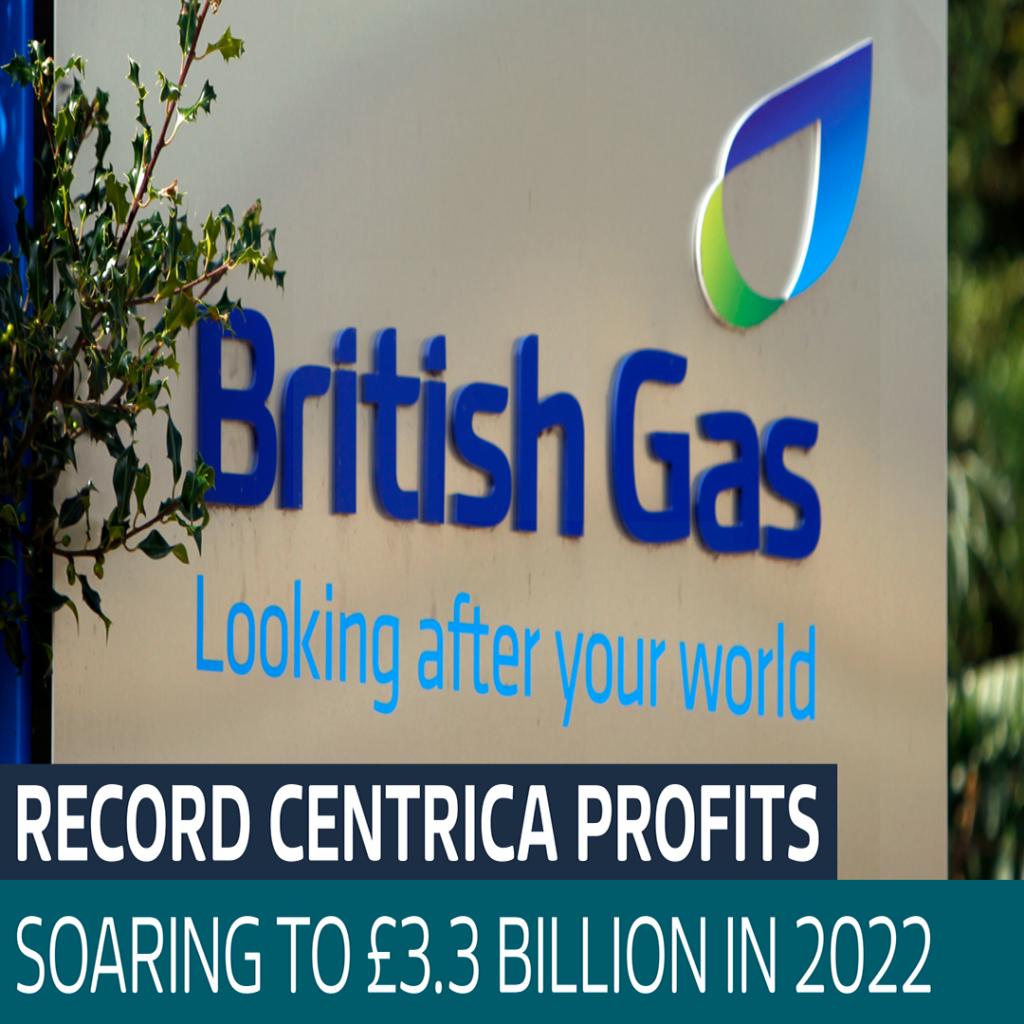Digital Zeitgeist – Centrica The Owner Of British Gas Saw Its Profits Treble to A “Obscene” £3.3 Billion
Campaigners who are advocating for stricter windfall taxes are angered by the figure, which comes in the wake of the controversy surrounding prepayment metres.
The profits of the scandal-hit owner of British Gas have more than tripled to a record £3.3bn, boosted by soaring wholesale gas prices after Russia’s invasion of Ukraine and the fact that many households in Britain are struggling with the cost of living.
Against the backdrop of the controversy surrounding prepayment metres, Centrica’s “monster” profits have provoked instant fury among activists who are demanding more stringent windfall taxes, reduced costs, and improved treatment of consumers who are more vulnerable.
The company expects its earnings for 2022 to be significantly higher than the £948 million it made in 2021. This is because the company’s North Sea oil and gas sector, as well as its nuclear power division, have seen their revenues skyrocket. In addition to this, they beat the previous record profit of the corporation, which was $2.7 billion in 2012.
The general secretary of the Unite union, Sharon Graham, said the profits were “obscene”. “These energy companies are showing us everything that is wrong with the UK’s broken economy,” she said.
The Trades Union Congress general secretary, Paul Nowak, called for public ownership of energy companies and said: “While millions of families struggle to heat their homes, firms like Centrica are raking in monster profits.”
The dividend that Centrica paid out to its shareholders was suspended during the Covid epidemic but was resumed the following year when the company issued an interim payout of £59 million. On Thursday, the company announced that stockholders will be receiving a dividend this year with a total value of more than £200 million.
The company will spend a further £300m on buying back its own shares, on top of a previously announced £250m share buyback.
On Thursday morning, shares of Centrica increased by 5%, making it the most successful climber on the FTSE 100.
When it came to light earlier this month that debt agents working for Britain’s largest energy supplier, British Gas, had ignored the vulnerabilities of customers and put them onto prepayment metres in order to recover debts, British Gas was the target of considerable criticism.
As a result of the disclosures, the firm has temporarily stopped installing prepayment metres using court orders, and the practice has been temporarily banned across the board for all suppliers.
On Thursday, Centrica said it was “extremely disappointed by the allegations surrounding one of our third-party contractors”.
Chris O’Shea, Centrica’s Chief Executive Officer, stands to earn more than £3 million in salary and bonuses as part of a compensation plan that is tied to the company’s financial results. This package may include an annual bonus of up to £1.6 million.
He gave up a yearly incentive of £1.1 million in 2021 and campaigners are now urging him to do the same again.
The profits that Centrica made in the North Sea are subject to the windfall tax that is levied on oil and gas companies operating in the North Sea. In addition to this, it holds a 20% share in Britain’s nuclear power stations, which are liable to pay the energy generating fee that was introduced by Jeremy Hunt, the chancellor, in order to collect windfall earnings.
On the other hand, Labour has advocated for an increase in the windfall tax on oil and gas production in order to collect a larger share of the profits.
In recent weeks, there has been a rise in the number of people calling for a higher windfall tax on oil and gas corporations. This comes after many big businesses, such as BP and Shell, announced record profits.
Labour has called for the scrapping of an investment allowance which cuts tax for oil and gas operators that spend money on increasing production.
Sana Yusuf, a climate campaigner at Friends of the Earth, said the government “needs to step up and back growing calls for a tougher windfall tax on the excessive profits of fossil fuel companies like Centrica to help fund the investment in insulation and homegrown renewables needed to bring down bills and cut emissions”.
But compared to its debts of £4 billion three years ago, Centrica said that its turnaround under O’Shea was “well advanced,” and the company stated that it had £1.2 billion of cash on its balance sheet. Nonetheless, the corporation did suffer a loss of £2.4 billion as a result of the sharp decline in wholesale prices for gas and electricity that occurred towards the end of 2022.
The energy supply division of British Gas reported a 39% drop in profits, which totaled £72 million. The organisation made the announcement in August that it will contribute 10% of income from that business to assist its less well-off clients in managing the growing cost of their gas and electricity bills for the “duration of the energy crisis”.
The company said it had invested £200m in customer service, support and pricing as energy bills soared. Centrica said: “We are very aware of the difficult environment many customers are facing due to the high level of energy bills and wider inflationary impacts and we will continue to do what we can to support them.”
Consumers have voiced concerns that energy providers are keeping too much of their money in reserve without their permission. Centrica, which has advocated that customer monies should be ringfenced, stated on Thursday that it retained £643 million in client deposits in a separate account from its general operating funds.
online sources: theguardian.com, centrica.com, foei.com

